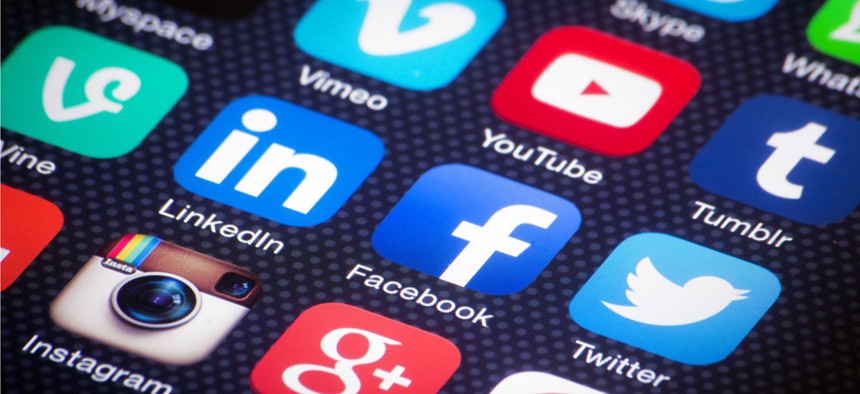Federal Employees, Don’t Do This on Social Media

Twin Design/Shutterstock.com
Ethics officials say they’ve been inundated with questions from agencies about how their employees’ Twitter and Facebook habits conform with govermentwide ethics rules.
The Office of Governmentwide Ethics has laid out new guidance for personal social media use by government employees.
Ethics officials say they’ve been inundated with questions from agencies about how their employees’ Twitter and Facebook habits conform with govermentwide ethics rules.
Much of the guidance laid out in the April 9 memo to agency officials amounts to common sense. But here are some of the specific dos and don’ts that could trip up social-media savvy feds.
Bosses: Don’t Ask Employees to Help You Tweet
Generally, when employees are on duty, governmentwide conduct standards require they focus their time on official duties. Some agencies may allow “limited personal use” of government resources, a laptop, say, to check social media.
However, one big no-no? Your boss asking you to help him or her set up a personal social media account.
A supervisor cannot order -- or even ask -- a subordinate to work on the supervisor’s personal social media account.
“Coercing or inducing a subordinate to maintain the supervisor’s personal account would amount to a misuse of position and, if done on official time, a misuse of official time,” the guidance states.
You Can Use Your Work Title -- But Consider a Disclaimer
Many federal employees have asked the ethics office about referencing their official titles on their personal social media accounts. In general, employees are prohibited from using their official titles or position “for private gain,” the guidance states.
However, simply listing your official title in their Twitter bio, for example? That “ordinarily will not create the impermissible appearance of governmental sanction or endorsement,” ethics guidance states.
Regardless, in your personal Tweets and postings, you shouldn’t say you’re acting on behalf of the government, refer to your connection to the government to support your statements or prominently feature the agency’s name or seal.
When in doubt, slap a quick disclaimer on your social media account, something that gets across the message that the views expressed are your own and not those of your employer -- the U.S. government.
“A clear and conspicuous disclaimer will usually be sufficient to dispel any confusion that arises,” the ethics guidelines state.
LinkedIn: Endorsements OK, But Be Careful During the Job Search
According to the guidance, endorsing another social media users’ skills (a la on LinkedIn) isn’t necessarily a misuse of position -- even if the LinkedIn account references your government post. That’s because such recommendations are “readily understood by users of the social media service to be personal, rather than official, in nature,” according to the guidance.
However, if you’re scrolling through LinkedIn or other social job-seeking social platforms, be careful.
The 2012 Stop Trading on Congressional Knowledge Act prohibits certain executive branch agency officials from directly negotiating with future employees without first filing a signed disclosure statement with their agency.
“In the age of social media, there are a multitude of ways that an employee might contact a prospective employer and thereby trigger the seeking employment rules,” the guidance cautions.
Simply posting a resume on a website or a summary of your job experience to LinkedIn is OK.
You’re also still in the clear if a potential employer views your resume -- and even if you’re sent an initial job offer.
However if you respond with “anything other than a rejection,” the government will consider you officially seeking employment and subject to the disclosure rules.
(Image via Twin Design/ Shutterstock.com)





